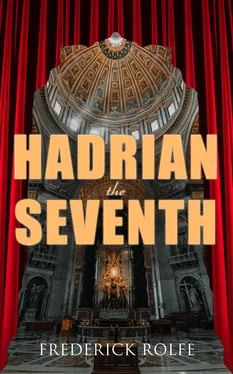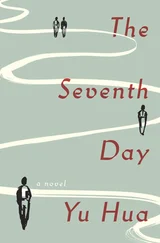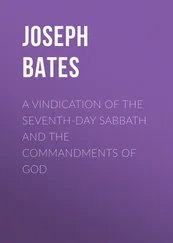"I mean did you form any opinion of your own concerning your Vocation?"
"No. My opinion concerning my Vocation, such as it was and is, had been formed when I was a boy of fifteen. I was very fervent about that time. I frankly admit that I played the fool from seventeen to twenty, sowed my wild oats if you like. But I never relinquished my Divine Gift. I just neglected it, and said 'Domani' like any Roman. And at twenty-four I became extremely earnest about it. Yes, my opinion was as now, unchanged, unchangeable."
"Continue," the cardinal said.
"A year after I left Maryvale, the Archbishop of Agneda was instigated by one of his priests, a Varsity man who knew me well, to invite me to volunteer for his archdiocese. I was only too glad. His Grace sent me to St. Andrew's College in Rome. The priest who recommended me, and Canon Dugdale, assured me that, in return for my services, my expenses would be born by the archbishop. They never were. I was more than one hundred and twenty pounds out of pocket. After four months in College I was expelled suddenly and brutally. No reason ever has been given to me; and I never have been aware of a reason which could justify so atrocious an outrage. My archbishop maintained absolute silence. I did hear it said that I had no Vocation. That was the gossip of my fellow-students, immature cubs mostly, hybrid larrikins given to false quantities and nasal cacophonies. I took, and take, no account of such gossip. If my legitimate superiors had had grounds for their action, grounds which they durst expose to daylight; and, if they frankly had stated the same to me, I believe I should have given very little trouble. As it is, I am of course a thorn, or a pest, or a firebrand, or a rodent and purulent ulcer— vous en faites votre choix . The case is a mystery to me, inexplicable, except by an hypothesis connected with the character of the rector of St. Andrew's College. I remember the Marquess of Mountstuart reading a leading article about him out of The Scotsman to me in 1886, and remarking that he was 'an awful little liar.' But perhaps the right reverend gentleman is known to Your Eminency?"
"Well known, Mr. Rose, well known. And now tell me of your subsequent proceedings."
"I made haste to offer my services to other bishops. When I found every door shut against me, I firmly deliberated never to recede from my grade of tonsured clerk under any circumstances whatever; and I determined to occupy my energies with some pursuit for which my nature fitted me, until the Divine Giver of my Vocation should deign to manifest it to others as well as to myself. I chose the trade of a painter. I was just beginning to make headway when the defalcations of a Catholic ruined me. All that I ever possessed was swallowed up. Even my tools of trade illegally were seized. I began life again with no more than the clothes on my back, a Book of Hours, and eight shillings in my pocket. I obtained, from a certain prelate, whose name I need not mention, a commission for a series of pictures to illustrate a scheme which he had conceived for the confounding of Anglicans. He saw specimens of my handicraft, was satisfied with my ability, provided me with materials for a beginning and a disused skittle-alley for a studio; and, a few weeks later (I quote his secretary), he altered his mind and determined to put his money in the building of a cathedral. I think that I need not trouble Your Eminency with further details."
"Quite unnecessary, Mr. Rose."
"I don't know how I kept alive until I got my next commission. I only remember that I endured that frightful winter of 1894–5 in light summer clothes unchanged. But I did not die; and, by odds and ends of work, I managed to recover a great deal of my lost ground. Then a hare-brained and degenerate priest asked me to undertake another series of pictures. I worked two years for him: and he valued my productions at fifteen hundred pounds: in fact he sold them at that rate. Well, he never paid me. Again I lost all my apparatus, all my work; and was reduced to the last extreme of penury. Then I began to write, simply because of the imperious necessity of expressing myself. And I had much to say. Note please that I asked nothing better than to be a humble chantry-priest, saying Mass for the dead. It was denied me. I turned to express beautiful and holy ideals on canvas. Again I was prevented. I must and will have scope, an outlet for what the President of Maryvale called my 'talent and energy.' Literature is the only outlet which you Catholics have left me. Blame yourselves: not me. Oh yes, I have very much to say."
He paused. The cardinal evaded his glance; and intently gazed at the under-side of well-manicured pink-onyx finger-nails.
"And about your Vocation, Mr. Rose. What is your present opinion?"
George wrenched himself from retrospection. "My opinion, Eminency, as I already have had the honour of telling you, is the same as it always has been."
"That is to say?"
"That I have a Divine Vocation to the Priesthood."
"You persist?"
"Eminency, I am not one of your low Erse or pseudo Gaels, flippertigibbets of frothy flighty fervour, whom you can blow hither and thither with a sixpence for a fan. Thank The Lord I'm English, born under Cancer, tenacious, slow and sure. Naturally I persist."
Catdinalitial eyebrows re-ascended. "The man, to whom Divine Providence vouchsafes a Vocation, is bound to prosecute it."
"I am prosecuting it. I never for one moment have ceased from prosecuting it."
"But now you have attained a position as an author."
"Yes; in the teeth of you all; and no thanks to anyone but myself. However that is only the means to an end."
"In what way?"
"In this way. When I shall have earned enough to pay certain debts, which I incurred on the strength of my faith in the honour of a parcel of archiepiscopal and episcopal and clerical sharpers, and also a sum sufficient to produce a small and certain annuity, than I shall go straight to Rome and square the rector of St. Andrew's College."
"Sh-h!" the bishop sibilated. The cardinal threw up delicate hands.
"Yrmnts mustn't be offended by Mr. Rose's satirical way of putting it," the bishop hastily put in. "He's a regular phrasemaker. It's his trade, you know. But at the bottom of his good heart I'm sure he means nothing but what is right and proper. And, George, you're not the man to smite the fallen. Monsignor Cateran was deposed seven years ago and more."
"I beg Your Eminency's pardon if I have spoken inurbanely; and I thank Your Lordship for interpreting me so generously. I didn't know that Cateran had come to his Cannae. Really I'm sorry: but, I've been stabbed and stung so many years that, now I am able to retaliate, I am as touchy as a hornet with a brand new sting. I can't help it. I seem to take an impish delight in making my brother-Catholics, especially clerks, smart and wince and squirm as I myself have squirmed and winced and smarted. I'm sorry. I simply meant to say that, when I have made myself free and independent, then I will try again to give you evidence of my Vocation."
"Have you approached your diocesan recently?" the cardinal inquired.
"His Grace died soon after my expulsion from St. Andrew's College. I approached his successor, who refused to hear me; and is dead. I never have approached the present archbishop, beyond giving him notice of my existence and persistence; for I certainly will not come before him with chains on my hands."
"Chains?"
"Debts."
"Have you any special reason for belonging to the archdiocese of Agneda?"
"There is a certain fascination in the idea of administering to a horde of unspeakable barbarians, 'the horrible and ultimate Britons, ferocious to strangers.' Otherwise I have no special reason. I had no choice. I happen to have been made an ecclesiastical subject of Agneda at the instance of Mr. George Semphill and at the invitation of the late Archbishop Smithson. That is all."
Читать дальше











